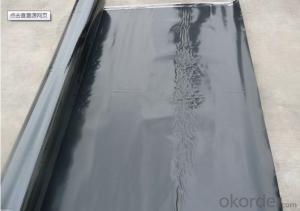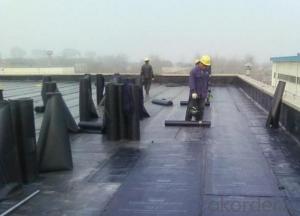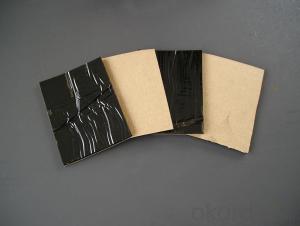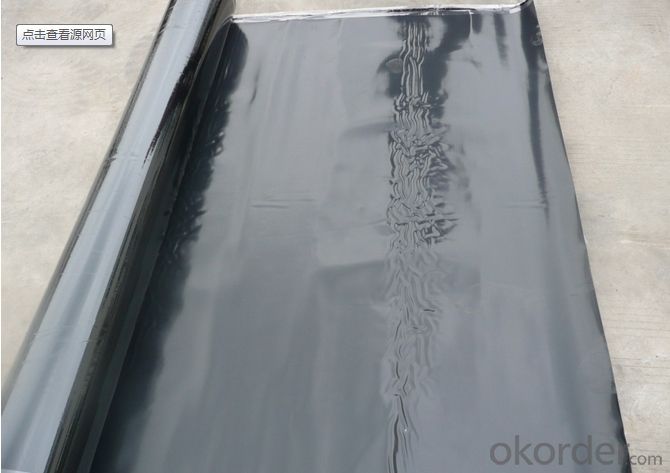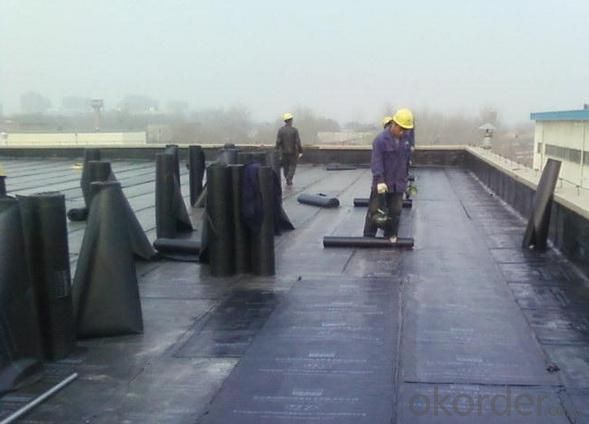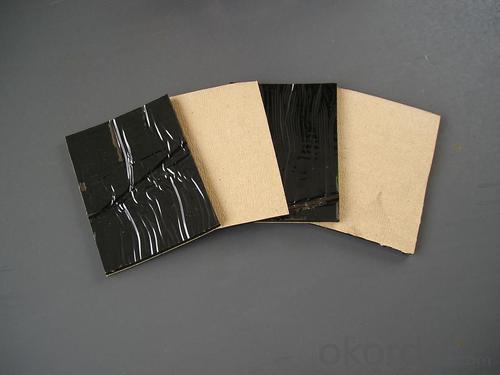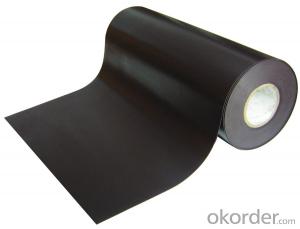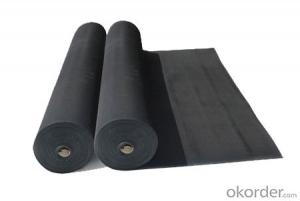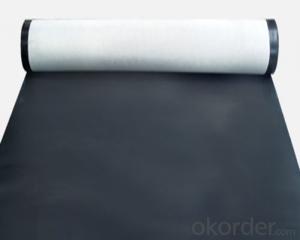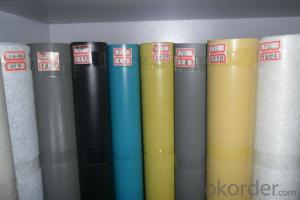EPDM Weldable Waterproofing Membrane Underground Protection
- Loading Port:
- China main port
- Payment Terms:
- TT OR LC
- Min Order Qty:
- 5000 m²
- Supply Capability:
- 100000 m²/month
OKorder Service Pledge
OKorder Financial Service
You Might Also Like
Introduction for EPDM Waterproofing Membrane:
Waterproof membrane for roof adopt the international advanced level cold feed extrusion continuous vulcanization process for the integration of production equipment and technology so that the system density of products is better and the products have no bubble sooth surface, no performance difference between vertical and horizontal.
Application of EPDM Waterproofing Membrane:
EPDM waterproof membranes form an effective barrier to liquid water or water vapor in the roof construction for industrial and civil engineering, underground engineering such as subway & tunnel, water conservancy such as water pools & ditch, shelter, grain depot, land filling, dyke and subwayt.
Specification of EPDM Waterproofing Membrane:
No. | Item | Unit | Standard Request | |
1 | Variation in Dimension | Thickness | % | ±10 |
Width | % | ±1 | ||
Length | % | No Negative Value | ||
2 | Tensile Strength at Break(Normal Temperature) | Mpa | ≥7.5 | |
Tensile Strength at Break(60ºC) | Mpa | ≥2.3 | ||
3 | Elongation at Break(Normal Temperature) | % | ≥450 | |
Elongation at Break(-20ºC) | % | ≥200 | ||
4 | Tearing Strength | KN/m | ≥25 | |
5 | Water Impermeability(30min) | * | 0.3Mpa Impermeability | |
6 | Bend Temperature | ºC | ≤-40 | |
7 | Heating Expansion/Shrinkage | Expansion | mm | ≤2 |
Shrinkage | mm | ≤4 | ||
8 | Hot Air Aging 80ºC x168h | Unchanging of Tensile Strength at Break | % | ≥80 |
Unchanging of Tearing Strength | % | ≥70 | ||
9 | Property of Anti Alkali 10% Ca(OH)²x 168h normal temperature | Unchanging of Tensile Strength at Break | % | ≥80 |
Unchanging of Tearing Strength | % | ≥80 | ||
10 | Elongation 40%,500x102 | * | No Crack | |
11 | Artificial Aging | Unchanging of Tensile Strength at Break | % | ≥80 |
Unchanging of Tearing Strength | % | ≥70 | ||
Appearance of 100% elongation | * | No Crack | ||
Product Features
A.Polyester based SBS Modified Bitumen Waterproofing Membrane
a. Strong impermeability
b. High tensile strength, elongation, ability to adapt the grassroots shrinkage deformation and cracking
c. Puncture-resistant, broken resistant, tear-resistant
d. The corrosion resistance, resistance to mildew, weathering good
e. Construction convenient, hot-melt can be operated Four Seasons Construction, reliable joints
B. Fiberglass based SBS Modified Bitumen Waterproofing Membrane
a. High tensile strength, stability of a good size
b. High Temperature good performance
c. Damage resistance, corrosion resistance, resistance to mildew, weathering good performance
d. Good construction performance, reliable joints.
FAQ of Waterproofing Membrane
a.Can we get some samples before place order?
Answer: We can send the free samples to you by freight collect.
b.How many years can your PVC membrane guarantee?
Answer: We will guarantee the quality for 5 years at least.
c.Which countries you ever export the product?
Answer: We export the PVC membrane to South Africa, Middle east and even European countries.
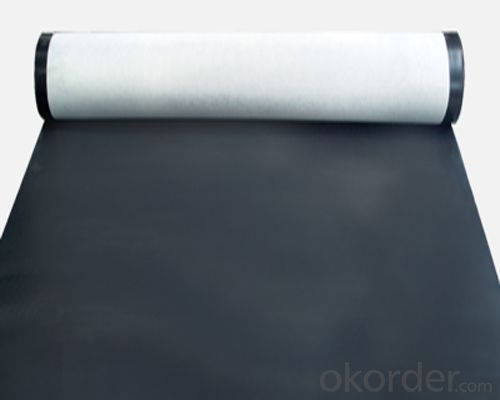
- Q: Can a waterproofing membrane be used for underground utilities?
- Underground utilities can benefit from the use of a waterproofing membrane. These membranes are specifically designed to act as a barrier against water penetration, safeguarding the underlying structure from moisture damage. This becomes particularly significant for underground utilities, which face constant exposure to the surrounding soil and potential water seepage. Applying a waterproofing membrane to underground utilities, such as water pipes, sewer lines, or electrical conduits, aids in preventing water infiltration and subsequent corrosion or degradation of the materials. Acting as a protective layer, the membrane ensures that the utilities remain dry and free from moisture-related issues. Different types of waterproofing membranes are available, including sheet membranes, liquid membranes, and spray-applied membranes, each possessing unique properties and installation methods. The selection of the appropriate membrane relies on factors such as the specific utility, surrounding soil conditions, and additional requirements like chemical resistance or structural reinforcement. It is crucial to emphasize that proper installation and maintenance of the waterproofing membrane are vital for its effectiveness. Trained professionals should handle the installation, adhering to manufacturer guidelines and industry best practices. Regular inspections and maintenance are also necessary to ensure the membrane remains intact and functional over time. In conclusion, the utilization of a waterproofing membrane is indeed suitable for underground utilities. This application provides protection against water infiltration and preserves the integrity and longevity of the utilities.
- Q: Are waterproofing membranes resistant to earthquake movements?
- Waterproofing membranes are not specifically designed to be resistant to earthquake movements. Their primary function is to prevent water penetration and protect structures from moisture damage. While they may provide some level of resistance to minor ground movements, they are not intended to withstand the significant forces generated during earthquakes. Additional seismic design measures and materials are required to ensure structures can withstand seismic events.
- Q: Can a waterproofing membrane be used for tunnels or subway systems?
- Yes, a waterproofing membrane can be used for tunnels or subway systems. Tunnels and subway systems are often subjected to water infiltration due to the surrounding soil conditions or groundwater levels. To prevent water from entering these underground structures, a waterproofing membrane is commonly applied. This membrane acts as a barrier, preventing water from seeping into the tunnels or subway systems. It is typically installed on the exterior surface of the tunnel walls and roof, creating a watertight seal. This helps to prevent corrosion, decay, and damage to the structural elements of the tunnels and ensures the safety and longevity of these underground infrastructures.
- Q: Can a waterproofing membrane be used on precast stainless steel surfaces?
- Precast stainless steel surfaces can indeed utilize a waterproofing membrane. Regardless of the substrate material, these membranes are specifically designed to form a protective barrier against water infiltration. To effectively safeguard against moisture and avoid any potential harm or leakage, the membrane can be directly applied to the stainless steel surface. However, it is crucial to carefully choose a suitable waterproofing membrane that demonstrates both compatibility with stainless steel and strong adhesion properties. Furthermore, it is imperative to adhere to proper surface preparation and application techniques in order to maximize the membrane's performance.
- Q: Can a waterproofing membrane be used on elevator shafts?
- Elevator shafts, when faced with water infiltration, particularly in areas with high water tables or during heavy rainfall, can benefit from the use of a waterproofing membrane. By applying a waterproofing membrane to the walls and floor of the elevator shaft, a reliable shield against water penetration can be established. This membrane, typically composed of sturdy materials like bitumen or rubberized asphalt, is applied in multiple layers to guarantee optimal protection. Serving as a waterproof barrier, it effectively halts water from seeping into the shaft and causing harm to the elevator equipment or building structure. Moreover, the waterproofing membrane aids in moisture and condensation control, averting issues such as mold growth. Proper installation and maintenance of the membrane are vital to ensure its continued effectiveness in preserving the dryness and safeguarding of the elevator shaft.
- Q: Are waterproofing membranes resistant to salt damage?
- Yes, waterproofing membranes are generally resistant to salt damage. They are designed to protect against moisture and other environmental factors, including saltwater. The membranes are specifically engineered to provide a barrier that prevents water and salts from infiltrating and causing damage to underlying structures.
- Q: Can a waterproofing membrane be used on modified bitumen roofs?
- Yes, a waterproofing membrane can be used on modified bitumen roofs. In fact, it is a common practice to install a waterproofing membrane over modified bitumen roofs to provide an additional layer of protection against water infiltration. This is especially important in areas with heavy rainfall or where the roof is prone to frequent exposure to water. The waterproofing membrane helps to seal any potential cracks or gaps in the modified bitumen roofing system, preventing water from seeping through and causing damage to the underlying structure. Additionally, the waterproofing membrane can also enhance the overall durability and longevity of the roof by protecting it from the harmful effects of moisture.
- Q: Can a waterproofing membrane be used on plywood surfaces?
- Yes, a waterproofing membrane can be used on plywood surfaces. Plywood is a commonly used material for construction, including outdoor projects such as decks and balconies. However, plywood is not naturally waterproof and can be susceptible to moisture damage over time. To protect plywood surfaces from water damage, a waterproofing membrane can be applied. This membrane acts as a barrier, preventing water from seeping into the plywood and causing rot or decay. There are various types of waterproofing membranes available, including liquid-applied membranes, sheet membranes, and peel-and-stick membranes. These membranes are designed to adhere to the surface of the plywood and create a watertight seal. It is important to follow the manufacturer's instructions for proper application and ensure that the plywood surface is clean and dry before applying the membrane. By using a waterproofing membrane, plywood surfaces can be effectively protected from water damage, extending their lifespan and maintaining their structural integrity.
- Q: Can a waterproofing membrane be installed by a homeowner or is professional installation required?
- Professional installation is typically recommended for waterproofing membrane installation. This is because it involves complex techniques and specialized equipment that homeowners may not have. Additionally, professionals are trained to assess and address specific waterproofing needs, ensuring a more reliable and effective installation.
- Q: Are waterproofing membranes effective in preventing water damage?
- Yes, waterproofing membranes are highly effective in preventing water damage. These membranes are designed to create a barrier that prevents water infiltration and moisture penetration into various surfaces such as roofs, basements, and foundations. By applying a waterproofing membrane, you can significantly reduce the risk of water damage caused by leaks, seepage, or condensation. Waterproofing membranes are typically made from durable materials like rubber, PVC, or bitumen, which are highly resistant to water and moisture. They are applied to surfaces using different methods such as spraying, rolling, or adhering them with a special adhesive. Once applied, these membranes create a seamless and watertight seal that effectively prevents water from seeping through. In addition to their effectiveness in preventing water damage, waterproofing membranes also offer other benefits. They can help improve energy efficiency by reducing heat loss or gain, as well as protect against the growth of mold and mildew. Moreover, waterproofing membranes can extend the lifespan of the protected surfaces by preventing water-related deterioration such as corrosion or rot. It is important to note that the effectiveness of waterproofing membranes depends on proper installation and regular maintenance. Any flaws or damage in the membrane can compromise its ability to prevent water damage. Therefore, it is essential to hire professional contractors with experience in waterproofing to ensure the membranes are applied correctly and regularly inspected for any signs of wear or damage. Overall, waterproofing membranes are a reliable and effective solution for preventing water damage. They provide a long-lasting and robust barrier against water infiltration, which helps protect the structural integrity of buildings and prevents costly repairs caused by water-related issues.
Send your message to us
EPDM Weldable Waterproofing Membrane Underground Protection
- Loading Port:
- China main port
- Payment Terms:
- TT OR LC
- Min Order Qty:
- 5000 m²
- Supply Capability:
- 100000 m²/month
OKorder Service Pledge
OKorder Financial Service
Similar products
Hot products
Hot Searches
Related keywords
